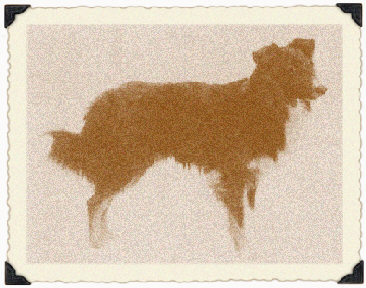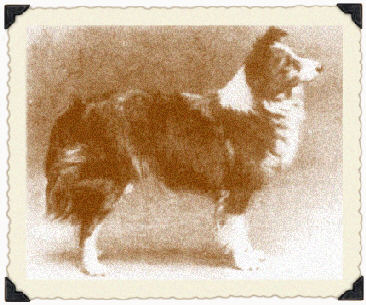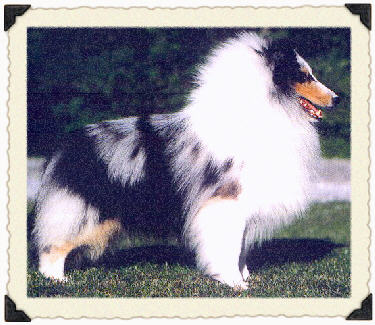
The "Toonie" or
"farm" dog from the Shetland Isles
Please read this original account
The Sheltie of today is a wonderful well coated companion who still carries within his genes the same intelligence and abilities that were bred into the Toonie. However, few, if any endure the same harsh conditions of the Sheltand Isles where the Toonie was developed. They have evolved into a companion and performance dog almost without peer thanks to the Shetlander's wee "farm" dog. The main purpose of the early Sheltie came about as the Shetlander's diminutive livestock jumped into walled gardens to munch on veggies. The Sheltie or Toonie, with their agile movements took this job of eradicating garden intruders seriously. Well now, that explains Piper's need to "chase off", the USP person and the Postman. Little did I know they were after the garden veggies!? Thank goodness for Piper's inherited wisdom... It isn't hard
to imagine an ancestral Sheltie charging after a sheep with it's mouth
(full of whatever Shetlander's grew), springing over the garden wall. The
Sheltie doubtless hurled his small body over the wall in hot pursuit! Has
anyone ever noticed if Shetland Sheep run fast!? I figure with a Sheltie
always on their heels that this particular breed of Sheep even with short
legs must have developed turbo boosters to leap garden walls in a single
bound. Our UPS man sure can make it back to his truck awfully fast!! All
kidding aside, we can be grateful for the benefits acrued from chasing
away livestock which gave us an extremely fast, athletic dog today for
agility.
Another job handed to the Toonie was that of flock guardian and herding dog. I read somewhere that our early Sheltie's were often left alone on the moors to guard flocks of Sheltand Sheep. Their main purpose for this job would have been to ward off predators and remind the dim witted Sheep to stay away from cliff edges. Once again I now have an explanation for why Piper does not want anyone to leave the house. He's seen the back porch, clearly resembles a cliff to him. Why if left to our own devises surely one of us might miss the steps! It is Piper's "job" to constantly remind us of this fact hourly. How did the Sheltie get from the Sheltand Isles to America? Sailors, my friends and some intuitive British folk who fancied this little dog needed to be preserved. Actually, the Sailors wanted them as gifts for family members and the Shetlanders were more than happy to line their pockets with wayfaring currency. Unfortunately, those early Sheltie travelers probably do not factor as an influence on our present day dogs. It is thought that any which made it to America were only kept as pets. As far as our
present day show dogs, we can thank the breeders who despite their differences
were able to "preserve, yet purify" the old Toonie dog of the Shetland
Isles. The squabble between the two factions of Sheltie lovers arose over
whether the Sheltie should be maintained in it's "original" smaller size
or further enhanced with an infusion of Collie. Well, I believe both groups
thumbed their noses at each other and set about achieving their own dreams.
While attending shows and watching the Sheltie breed ring it is obvious
to me that we have two distinct type of Shelties running around.
I have seen the very little Sheltie topping out at 13" and the somewhat larger boned version pushing 16". My favor falls with the larger version, although that is not meant to discount all the lovely little Sheltie's out there charming people's hearts. Take Piper for instance, he is 19" tall and weighs in at a hefty 40+ pounds. Clearly, that is a bit large for any Sheltie. However, he can hold his own very well when being pummeled by an errant Border Collie. I fear if we owned one of the little ones they might play badmitten with the poor soul. Yikes! In England,
the Sheltie (referred to as the Shetland Collie), was first recognized
in 1909. America followed suit giving the Sheltie official kudos a year
later. Due to problems with the Collie fanciers finding affliation with
their breed's name distasteful, the Shetland Collie was changed to Shetland
Sheepdog. In 1929, the Sheltie's population in America was growing steadily
and so the American Shetland Sheepdog Association (ASSA), was born. Today,
the Sheltie has won over more hearts than the Collie. Secretly, I believe
the Sheltie's were out for revenge when the Collie people snubbed their
original name.
There you have it! The rest of the Sheltie story... Should you find yourself thirsting for more knowledge on our breeds mysterious ancestors, buy a ticket to the Shetland Isles and do some research there. If the airfare is more than you willing to proffer, there are a plethora of Sheltie links floating around on the Web.
Stop by
Awesome Collection of Historical Shetland Sheepdog Links.
|
|||||||||||||||||





